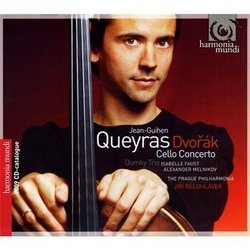| All Artists: Jean-Guihen Queyras, Isabelle Faust, Alexander Melnikov Title: Dvorak: Cello Concerto, Dumky Trio Members Wishing: 0 Total Copies: 0 Label: Harmonia Mundi Original Release Date: 1/1/2009 Re-Release Date: 6/9/2009 Album Type: Import Genre: Classical Styles: Chamber Music, Forms & Genres, Concertos, Symphonies Number of Discs: 1 SwapaCD Credits: 1 Other Editions: Dvorák: Cello Concerto UPC: 794881910724 |
Search - Jean-Guihen Queyras, Isabelle Faust, Alexander Melnikov :: Dvorak: Cello Concerto, Dumky Trio
 | Jean-Guihen Queyras, Isabelle Faust, Alexander Melnikov Dvorak: Cello Concerto, Dumky Trio Genre: Classical
|
Larger Image |
CD Details |
CD ReviewsBeauty. Slow Beauty J. F. Laurson | Washington, DC United States | 05/04/2006 (5 out of 5 stars) "This is a marvellous addition to the crowded market of Dvorak Cello Concerto recording. Superbly played and inexcellent sound, Queyras and Co. (both in the Concerto and coincidentally in the Trio) succeed especially in creating some of the finest slow movements I have ever heard. Note the least on account of those, this recording moved into the company of the other two versions of the Cello that I hold in high estimate: the famous Karajan/Rostropovich on DG and the molten-lava-like Celibidache/Du Pre on Telarc (formerly DG). Warmly recommended. " This is a great one Eric S. Kim | Southern California | 05/22/2006 (5 out of 5 stars) "There's really not much to say about this Dvorak Cello Concerto recording; only that it's magnificent. Jean-Guihen Queyras gives the cello a nice polish and panache, and it's most clearly evident in the slow-paced second movement (it sounds so pure and heavenly). Jiri Belohlavek and the Prague Philharmonia create a beautiful atmosphere (kudos to Harmonia Mundi for the excellent sound quality). The woodwinds are clear, the brasses are energetic, and the strings are typically handled with Bohemian finesse. This is hands down one of the finest recordings for Dvorak's Cello Concerto ever put on a compact disc. Get it while you still can." How Do You Spell "magnificent" in Czech? Giordano Bruno | Wherever I am, I am. | 10/06/2009 (5 out of 5 stars) "If there's any logic in the Universe, the word should be "Queyras"! This is a magnificent performance by the young cellist Jean-Guihen Queyras, one of the new wave of cellists who are equally facile on baroque or modern instruments. I've already reviewed Queyras's performance of the six Bach Suites for solo cello; it's magnificent! Now I have to exclaim in wonder at his interpretation of the workhorse Cello Concerto by Antonin Dvorak, a composition I've always enjoyed in almost any performance. I have several versions on CD, so I decided to listen to Queyras's head-to-head with the far better-selling recording by Yo-Yo Ma with the New York Philharmonic. It was quite a revelation; to my ears, Queyras wins every round, but I was also surprised that the Prague Philharmonic outplayed the New Yorkers dramatically in the first and third movements. The concerto begins orchestrally; several minutes pass before the cello enters, and those minutes reveal a great deal. The Prague Orchestra is splendidly transparent (here's my neologism: 'transhearable) in allowing each instrumental timbre to be heard, even amid massed orchestral declamations. The tuning is better, the recording acoustic is sharper, I knew before the cello uttered a note that the contest was over.
Possibly it's Queyras's profound understanding of the baroque cello and of the aesthetic of "historically informed performance" than makes his cello so lovingly voice-like. Think of a voice like that of Dietrich Fischer-Dieskau, a voice that can project beauty on every note of its range and warmth at ever level of dynamics. That's Queyras's cello. Besides, his bowing is far more precise than Ma's, and it makes his quick passages both elegant and eloquent, while Ma's sound only vigorous. This is unquestionably the best performance of the Dvorak I've ever heard. Some reviewers elsewhere have objected to the recording technology of this CD. They accurately point out that the cello is close-miked, while the orchestra is miked for a more general ambience. Thus, they say, the sound you hear is unlike any sound you would hear in alive performance. And so it is, but all for the better! What you hear is what the cellist himself hears while playing: his own voice in his own space, in dialogue with the orchestra BEHIND him. The concerto form is always potentially such a agon, soloist against symphony. A cello concerto risks much, in that the cello doesn't easily hold its own against 20 violins and a ragtag of other instruments. The forces used by the Prague Orchestra in this recording are not so small - 14 violins, for instance, and three horns - but conductor Jiri Behohlavek reins them in and makes the ensemble sound as tight as a chamber orchestra. Then, happy day, the CD is rounded out with the finest music Dvorak ever wrote, the "Dumky" Trio #4 for piano, violin, and cello, rather than the oft-paired Cello Concerto by Victor Herbert - Ma's match-up - which I'd be willing never to hear again. Pianist Alexander Melnikov and violinist Isabelle Faust clearly share the same aesthetic as Queyras; they seem to listen "through' each other with generous ensemble. Altogether this is a 'magnificent' CD. Note that there seem to be several 'editions' or releases of it, at different prices, including in in SACD." |

 Track Listings (9) - Disc #1
Track Listings (9) - Disc #1